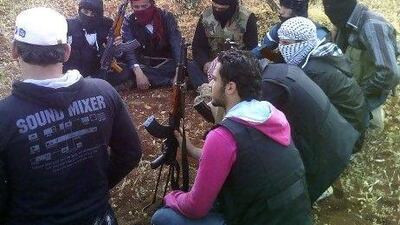WASHINGTON // Two weeks after their bold promise, Saudi Arabia and other Gulf states have yet to start distributing money from a multimillion-dollar fund designed to prop up Syria's rebels and entice defections from President Bashar Al Assad's army, Syrian opposition members and international officials say.
The cash programme was outlined this month at a conference in Istanbul, where representatives of the United States and more than 60 other nations met to strengthen Syria's opposition and increase pressure on the Al Assad regime.
Hoping to crack Mr Al Assad's support, Washington and its Arab partners seized on the plan as a path forward even as they disagreed on the idea of giving weapons to Syrian rebels.
But the fund's implementation is already beset by problems - basically, how to get the money there and how to make sure it gets to the right people. There is no way to monitor where the money goes as the country veers towards civil war. Because the rebels hold no territory and struggle even to maintain communications inside and outside Syria, there is no clear way to deliver the money.
The problems underscore the larger problem to providing aid of any kind to the Syrian rebellion. The Obama administration recently signed off on US$12 million (Dh44m) in enhanced communications, medical and other "nonlethal" assistance to the opposition, but it is unclear what goods are making their way into Syria and by what means.
Even the recipients are largely unknown, with US officials saying they are still trying to get to know Syria's armed and political opposition better.
Other Arab and European countries have made similar pledges of aid that Syrians say they have not seen - five days into a UN-brokered ceasefire that was supposed to allow greater humanitarian and other relief to enter the country. But Mr Al Assad's government has launched more artillery attacks on opposition strongholds, continuing a year of violent repression that has killed more than 10,000 people and put into doubt international aid hopes.
In an effort to ramp up the pressure on Mr Al Assad further, France is convening a meeting today of countries leading the call for the Syrian leader's ouster. Hillary Clinton, the US secretary of state, and the foreign ministers of Qatar and Turkey are among the invitees, a French diplomatic source said. But no significant policy changes are expected at the gathering, according to officials with knowledge of the planning.
Widespread international scepticism over the feasibility of a ceasefire with Mr Al Assad is fuelling the debate over how to help the rebels better defend themselves.
Up to now, it does not appear that any governments are arming the opposition significantly and the US remains firmly opposed, fearful that further militarisation of the conflict could cause more violence and more deaths without necessarily accelerating Mr Al Assad's departure.
Weapons alone may not tip the balance - as was the case last year when western and Arab nations had to go to war to help Libyan rebels defeat Muammar Qaddafi.
In the United States, the Republican senator John McCain has suggested air strikes against Syrian armed forces that are far better trained than Qaddafi's and have much better morale.
The Obama administration has effectively ruled out such an escalation. European countries are unlikely to get militarily involved without the United States, and Turkey has backed off from talk of creating buffer zones along the Syrian border.
Any foreign military action could provoke anger from Russia and China, and open hostility from Iran.
As for the Gulf states, Hilal Khashan, political science professor at the American University of Beirut, doubted whether they would even be willing to pay the bill for the rebellion.
"There is a delicate balance of power in the Gulf," he said. "If the Saudis were to step up operations in Syria, the Iranians can respond by aggravating the situation in the Gulf. The two sides know what they are doing."

Getting money to the right people: the problems of funding Syria's rebels
The rebels hold no territory and struggle even to maintain communications inside and outside Syria, there is no clear way to deliver funds promised at a conference in Istanbul earlier this month.
Most popular today
